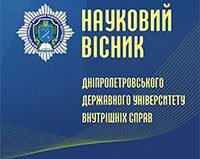Ivan BOHATYROV
BOHATYROV I. (2023), VICTIMOLOGICAL FEATURES OF VICTIMS OF FORCED MIGRATION,
Scientific Bulletin of Dnipropetrovsk State University of Internal Affairs, №3, 8-13
DOI: 10.31733/2078-3566-2023-3-8-13
ABSTRACT. The russian Ukrainian war, armed conflicts in the world are a cruel reality of the XXI century. Despite all the efforts of the norms of international humanitarian law and the actions of international organizations, which are done for the sake of peace, tranquility and normal life of people, the burden of human suffering, death and destruction, victims of forced migration is inevitably brought by war. And the most important thing is that all these processes continue to grow.
It has been proven that the treaties and conventions recognized by the states, even solemnly ratified, cannot save lives, prevent cruelty or protect the property of innocent people, all these factors create prerequisites for the forced resettlement of people to other countries or within their own countries.
Therefore, it is quite logical that the issue that should be put on the agenda of the criminal-legal and criminological block is the study of the victimological features of the victim of forced migration, including a foreigner. In this regard, scientific works dedicated to the study of victimological prevention are especially relevant and practically in demand.
Criminological science has developed sufficient knowledge about the identity of the criminal and his behavior, domestic criminologists should supplement this knowledge with a person who commits crimes in the conditions of the Russian-Ukrainian war. At the same time, the criminological toolkit for the study of crime in the conditions of the Russian-Ukrainian war should show its victimological side, since few researches were written and spoken about the victim of forced migration in these conditions, more about criminals of the armed forces of the Russian Federation, prisoners of war, collaborators.
According to the research conducted by us, victims of forced migration face difficulties in the process of finding employment, arranging housing, and purchasing basic household items for normal living. To a large extent, they lost their former economic, professional and even family ties and found themselves faced with the need to form a new social status – a foreigner, thanks to which they are able to join new social groups.
Therefore, the mass nature of forced migration is characterized not only by a large number of socio-psychological and economic problems, it also includes the victimological features of the victim of forced migration, which is characterized by aggressiveness, feelings of anxiety and confusion, loss of a sense of confidence, nervous and mental tension, which often leads to deviant personality behavior and negatively affects the results of adaptation.
Our study of the victimological characteristics of victims of forced migration allowed us to formulate the following conclusions: 1) a victim of forced migration is a person, a Ukrainian or a foreigner, who has been harmed as a result of war or armed conflict, including loss of housing, jobs, physical injuries, emotional and psychological suffering, a significant violation of their basic rights as a result of the action or inaction of military personnel of the armed forces of the aggressor state; 2) the victimological features of the victim of forced migration affect the nature and typical degree of social danger of the offense, and are not sufficiently taken into account when establishing the individualization and differentiation of criminal responsibility when issuing a court decision regarding the criminal offense committed by the criminal.
Keywords: victimology, victimhood, war, armed conflict, victim, foreigner, migration, criminal offense.
- References:
- Bohatyrov, I. H. (2023) Rosiisko-ukrainska viina: pohliad kryminoloha [The Russian Ukrainian war: the view of a criminologist] : monohrafiia. Kyiv : TOV «Vydavnychyi dim «ADEF UKRAINA», 244 s. [in Ukr.].
- Dzhuzha, O. M., Vasylevych, V. V., Cherniei, V. V., Cherniavskyi, S. S. (2020) Kryminolohiia [Criminology] : pidruchnyk / za zah. red. d-ra yuryd. nauk, prof. V. V. Chernieia ; za nauk. red d-ra yuryd. nauk, prof. O. M. Dzhuzhi. Kyiv : FOP Maslakov, 612 p. [in Ukr.].
- Tuliakov, V. A. (2000) Viktimolohyia (sotsyalnyye i kriminologicheskiye problemy) : monografiia. Odessa : Yurid. lit-ra, 336 p. [in russ.]
- McGarry, R., Walklate S. (2019) A Criminology of war? Bristol: Bristol univ. press,. 176 p.
- Bekariia, Ch. (1995) Pro zlochyny i pokarannia [About crimes and punishments]. Stels, 304 p. [in Ukr.].
- Deklaratsiia osnovnykh pryntsypiv pravosuddia dlia zhertv zlochyniv ta zlovzhyvannia vladoiu [Declaration of Basic Principles of Justice for Victims of Crime and Abuse of Power]. Prava liudyny v Ukraini. URL : https://khpg.org/1080460475 (access date: 03.07. 2023). [in Ukr.].
- Kerdyvar, V. V., Khrystenko, V. Ye. (2021) Syndrom zhertvy u vnutrishno peremishchenykh osib iz zony lokalnoho voiennoho konfliktu [Victim syndrome in internally displaced persons from the zone of local military conflict] : monohrafiia. Kharkiv, 143 p. [in Ukr.].
- Senatorov, M. V. (2003) Poniattia poterpiloho vid zlochynu v kryminalnomu pravi [The concept of a victim of a crime in criminal law]. Visnyk Akademii pravovykh nauk Ukrainy. № 1 (32), pp. 202–210. [in Ukr.].
- Mukshymenko, A. P., Yakovets, I. S. (2007) Zakhyst prav poterpiloho pry vykonanni kryminalnykh pokaran [Protection of the rights of the victim during execution of criminal punishments]. Kyiv : Palyvoda A. V. 180 h. [in Ukr.].
